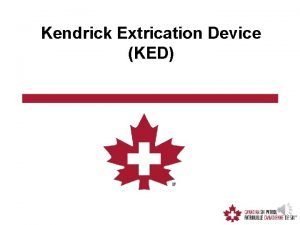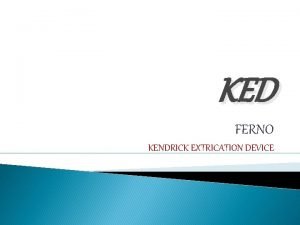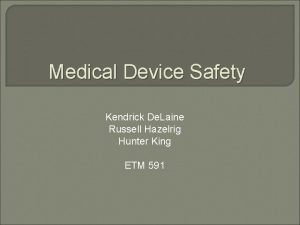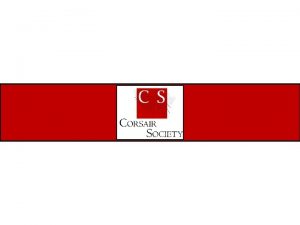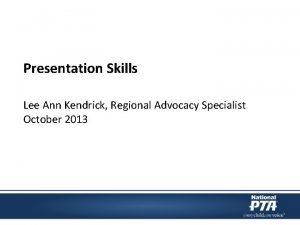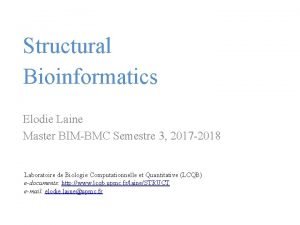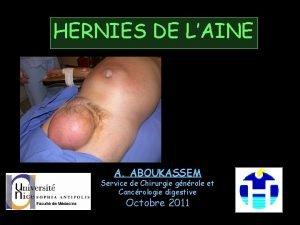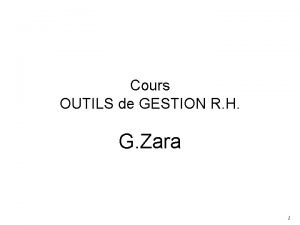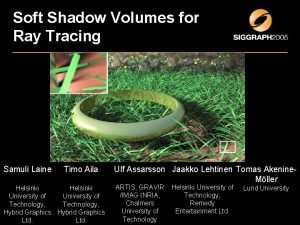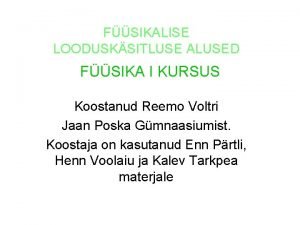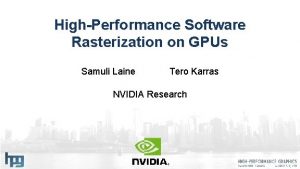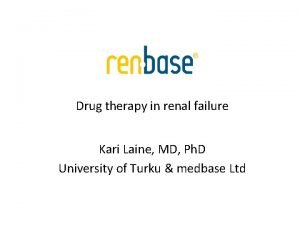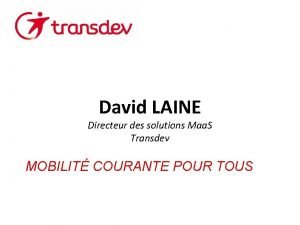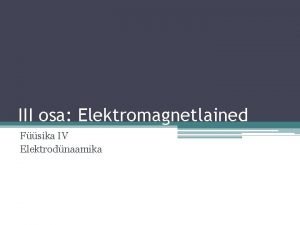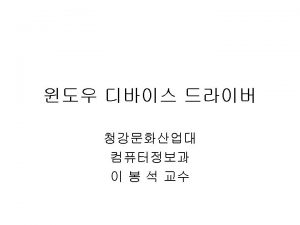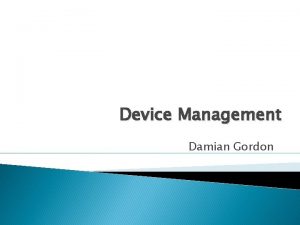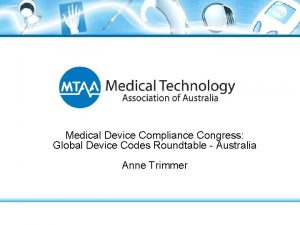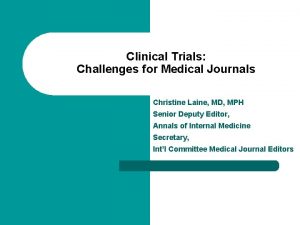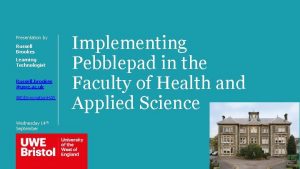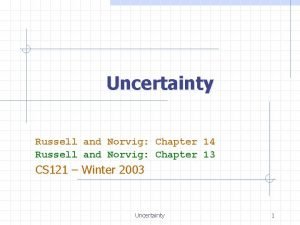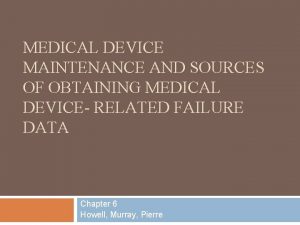Medical Device Safety Kendrick De Laine Russell Hazelrig



















- Slides: 19

Medical Device Safety Kendrick De. Laine Russell Hazelrig Hunter King ETM 591

Introduction • History for medical device safety can be traced back to 2000 B. C. • Modern Day Milestones – 1970: Occupational Safety and Health Administration (OSHA) – 1976: Medical Device Amendments – 1990: Safe Medical Devices Act • Western Electric Company: First Organization to set up an inspection department. (early 1990’s)

Device Safety VS Reliability • Safe medical system: A system that does not cause a high degree of risk to property, equipment or people. • Risk: An undesirable event that can occur and is measured in terms of probability and severity. • Safe/unreliable: Safe but fails frequently • Reliable/Unsafe: Device functions normally but puts people at risk.

Device Safety VS Reliability • Three categories of medical device safety – Unconditional safety • Preferred type of device safety • Elimination of all risks with medical devices – Conditional Safety • Used in situations when it is not feasible to have unconditional safety. – Descriptive Safety • Basic transport, replacement, maintenance, mounting operation, and connection safety. • Examples: Handle with care, this side up. . etc

Safety Requirements • Three Categories – Safe design: • Seven elements. – Electric shock, radiation, and environmental protection, care for hygienic factors, heating prevention, mechanical hazard prevention, and material choice – Safe Function: • Three elements – Accuracy of measurement, reliability, and warning for or prevention of dangerous outputs. – Sufficient Information: • Five elements: – Effective labeling, Instructions for use, production, packaging, accompanying documentation.

Device Life Cycle Concept Definition Development Phases of Device Cycle Deployment Production

Device Life Cycle Five Stages • Concept- uses preliminary hazard analysis to evaluate safety problems and its impacts • Definition- provide verification of initial design and engineering of device • Development- directed towards operational use, environmental impact, producibility, and integrated logistics support • Production- safety engineering report is made for the device that identifies hazards with the device • Deployment – data from any accidents or failures are collected. The safety analysis is updated and changes to device is reviewed

Safety Analysis Tools Technic of Operations Review Human Error Analysis Safety Analysis Methods Operating Hazard Analysis Preliminary Hazard Analysis

Safety Analysis Tools Techniques and Methods • Preliminary Hazard Analysis (PHA) First analysis preformed Identify critical areas, safety design criteria, and evaluate hazards • Operating Hazards Analysis (OHA) Focuses on hazards from the task by the operating system as the device is stored, transported, or used. Provide a basis for operations safety, warnings, and emergency procedures.

Safety Analysis Tools Techniques and Methods • Technic of Operations Review (TOR) A step by step analysis of workplace related accidents and failures. • Human Error Analysis (HEA) Used to highlight various types of hazards prior to occurrence. Effective Approaches: Perform Task Observing individual during work periods

Considerations For Safety Analysis Time required to obtain results Ways and means for getting the information to subcontractors Format and degree of detail of end result of data Type of information needed before performing the study Time frame for the study (review, update, submission, and completion)

Regulatory Compliance • FDA and ISO requires Manufacturers to follow a comprehensive approach to medical device safety. – Use a quality assurance manual to satisfy GMP and ISO 9000 requirements • Three Areas – Area 1: Outline company policy with respect to the manufacturing of medical devices. – Area 2: Administration of quality assurance department and it’s subdivisions. – Area 3: Outlining quality assurance directives to implement and monitor device conformance.

Areas of Quality Assurance Program Test Instrumentation Parts and Materials QA Quality Monitoring Software Quality Assurance Reliability Assessment Organization Certification Design Review Areas of Quality Assurance Programs Personnel Specifications Labeling Design Transfer

Areas of Quality Assurance Program Organization – the elements and aspects needed to develop the Specifications- translating the idea of the device into measureable Parts and Materials- the parts and materials used in device designs program, carry out program requirements, make audit program, document goals units; should address reliability, safety, stability, and precision are reliable enough to perform the task needed

Areas of Quality Assurance Program Design Transfer- transferring the laboratory design to full scale production Reliability Assessment- the basic estimation on the reliability of the device, for new or modified designs Design Review- determine and terminate any weaknesses in the design Personnel- the people who will review, analyze, and test the device design

Areas of Quality Assurance Program Software- main goal is software, maintainability, testability, and correctness Test Instrumentationcalibrating and maintaining all pieces of equipment used in testing the quality of the device Labeling- display labels, charts, manuals, panels, test and calibration procedures; make sure instructions are easy to understand for end user

Areas of Quality Assurance Program Quality Monitoring- used Certification- technical review that includes adequate to analyze quality problems, steps to prevent recurring problems identified, and determine failure patterns specifications, effectiveness of tests methods, overall quality assurance plan, and making sure there are no differences between final end device and approved device specifications

Questions ?

References http: //proxygsumer 1. galileo. usg. edu/login? url=http: //proquest. umi. com/pqdweb/? did=2086829811&Fmt=3&client. I d=30360&RQT=309&VName=PQD http: //proxygsumer 1. galileo. usg. edu/login? url=http: //proquest. umi. com/pqdweb/? did=2047819211&Fmt=3&client. I d=30360&RQT=309&VName=PQD http: //proxygsumer 1. galileo. usg. edu/login? url=http: //proquest. umi. com/pqdweb/? did=2025725371&Fmt=3&client. I d=30360&RQT=309&VName=PQD http: //proxygsumer 1. galileo. usg. edu/login? url=http: //proquest. umi. com/pqdweb/? did=2002893611&Fmt=3&client. I d=30360&RQT=309&VName=PQD Reliability Technology, Human Error, and Quality in Health Care Mindfully. org “Guidant Flaw Not Disclosed for 3 Years” BARRY MEIER
 Ked order of straps
Ked order of straps Ked ferno
Ked ferno Hardware output
Hardware output Medical device safety
Medical device safety Kendrick addaman
Kendrick addaman Identifying and managing project risk tom kendrick
Identifying and managing project risk tom kendrick Ann
Ann Elodie laine
Elodie laine Quadrilatère de grynfelt limites
Quadrilatère de grynfelt limites Pyramide des âges pelote de laine
Pyramide des âges pelote de laine Au temps de la bonne chanson
Au temps de la bonne chanson Ray tracing soft shadows
Ray tracing soft shadows Miks me ei taju osake-laine dualismi mikromaailmas?
Miks me ei taju osake-laine dualismi mikromaailmas? Hernie a laine
Hernie a laine Samuli laine
Samuli laine Kari laine
Kari laine David laine
David laine Marie madeleine son petit jupon de laine
Marie madeleine son petit jupon de laine Tatu laine
Tatu laine Laine levimiskiirus
Laine levimiskiirus
